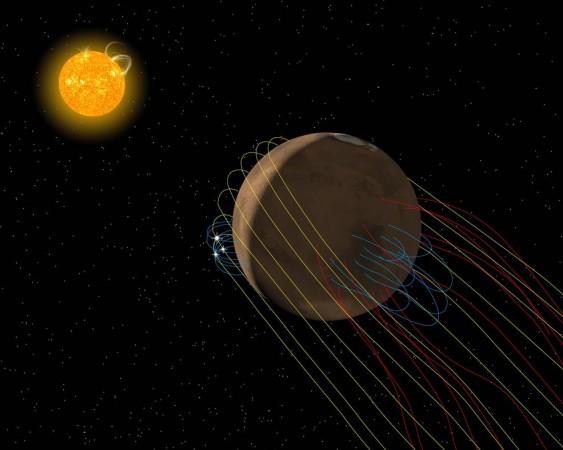
NASA's MAVEN (Mars Atmosphere and Volatile Evolution Mission) has unveiled a new surprising detail about Mars. It found that the Red Planet has a mysterious tail, which is magnetic.
ALSO READ: Giant cave discovered on Moon which could aid human colonisation on the lunar surface
Earth and Venus possess a magnetic field, which helps in shielding them from the harmful solar radiation, but Mars is believed to have lost its magnetic field and most of its atmosphere over billions of years.
"We found that Mars' magnetic tail, or magnetotail, is unique in the solar system," said Gina DiBraccio of NASA's Goddard Space Flight Center in Greenbelt, Maryland.
"It's not like the magnetotail found at Venus, a planet with no magnetic field of its own, nor is it like Earth's, which is surrounded by its own internally generated magnetic field. Instead, it is a hybrid between the two." DiBraccio is project scientist for MAVEN stated further.
Red Planet's "magnetotail" comprises of highly charged particles which have originated from solar wind that was connecting with the magnetic fields on the Mars' surface.
ALSO READ: NASA astronomers discover toxic hybrid ice cloud on Saturn's largest moon Titan
Based on the speculations made by the MAVEN astronomers on the new model they created, a phenomenon is referred to as --magnetic reconnection— will result the Martian magnetotail to twist 45 degrees from what is expected depending on the direction of the magnetic field carried by the solar wind.
These predictions were compared to the MAVEN data about the directions of Martian and solar wind magnetic fields and they were in good agreement, DiBraccio explained.
ALSO READ: Tipsy couple faces punishment for acting way too 'cheesy' and having sex at Domino's takeaway
The astronomers used a magnetometer on the MAVEN instrument to measure Mars' magnetotail. Magnetometer helps in scaling the direction and strength of the magnetic fields which are invisible.
"We found that Mars' magnetic tail, or magnetotail, is unique in the solar system," DiBraccio stated.
ALSO READ: You can have sex without a condom in these conditions: Experts
"It's not like the magnetotail found at Venus, a planet with no magnetic field of its own, nor is it like Earth's, which is surrounded by its own internally generated magnetic field. Instead, it is a hybrid between the two," DiBraccio concluded.
The magnetometer data will be analysed by the MAVEN researchers for the few upcoming years, as per NASA in order to understand how does the rotation of the planet affects its magnetic tail.












